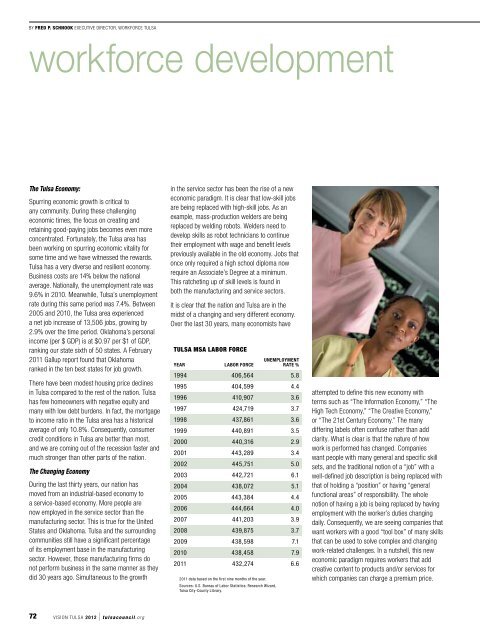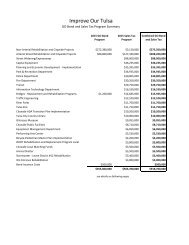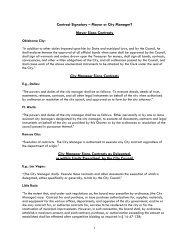Vision TULSA - The Tulsa City Council
Vision TULSA - The Tulsa City Council
Vision TULSA - The Tulsa City Council
You also want an ePaper? Increase the reach of your titles
YUMPU automatically turns print PDFs into web optimized ePapers that Google loves.
By Fred P. Schnook Executive Director, Workforce <strong>Tulsa</strong>workforce development<strong>The</strong> <strong>Tulsa</strong> Economy:Spurring economic growth is critical toany community. During these challengingeconomic times, the focus on creating andretaining good-paying jobs becomes even moreconcentrated. Fortunately, the <strong>Tulsa</strong> area hasbeen working on spurring economic vitality forsome time and we have witnessed the rewards.<strong>Tulsa</strong> has a very diverse and resilient economy.Business costs are 14% below the nationalaverage. Nationally, the unemployment rate was9.6% in 2010. Meanwhile, <strong>Tulsa</strong>’s unemploymentrate during this same period was 7.4%. Between2005 and 2010, the <strong>Tulsa</strong> area experienceda net job increase of 13,506 jobs, growing by2.9% over the time period. Oklahoma’s personalincome (per $ GDP) is at $0.97 per $1 of GDP,ranking our state sixth of 50 states. A February2011 Gallup report found that Oklahomaranked in the ten best states for job growth.<strong>The</strong>re have been modest housing price declinesin <strong>Tulsa</strong> compared to the rest of the nation. <strong>Tulsa</strong>has few homeowners with negative equity andmany with low debt burdens. In fact, the mortgageto income ratio in the <strong>Tulsa</strong> area has a historicalaverage of only 10.8%. Consequently, consumercredit conditions in <strong>Tulsa</strong> are better than most,and we are coming out of the recession faster andmuch stronger than other parts of the nation.<strong>The</strong> Changing EconomyDuring the last thirty years, our nation hasmoved from an industrial-based economy toa service-based economy. More people arenow employed in the service sector than themanufacturing sector. This is true for the UnitedStates and Oklahoma. <strong>Tulsa</strong> and the surroundingcommunities still have a significant percentageof its employment base in the manufacturingsector. However, those manufacturing firms donot perform business in the same manner as theydid 30 years ago. Simultaneous to the growthin the service sector has been the rise of a neweconomic paradigm. It is clear that low-skill jobsare being replaced with high-skill jobs. As anexample, mass-production welders are beingreplaced by welding robots. Welders need todevelop skills as robot technicians to continuetheir employment with wage and benefit levelspreviously available in the old economy. Jobs thatonce only required a high school diploma nowrequire an Associate’s Degree at a minimum.This ratcheting up of skill levels is found inboth the manufacturing and service sectors.It is clear that the nation and <strong>Tulsa</strong> are in themidst of a changing and very different economy.Over the last 30 years, many economists have<strong>TULSA</strong> MSA LABOR FORCEYEARLABOR FORCEUNEMPLOYMENTRATE %1994 406,564 5.81995 404,599 4.41996 410,907 3.61997 424,719 3.71998 437,861 3.61999 440,891 3.52000 440,316 2.92001 443,289 3.42002 445,751 5.02003 442,721 6.12004 438,072 5.12005 443,384 4.42006 444,664 4.02007 441,203 3.92008 439,875 3.72009 438,598 7.12010 438,458 7.92011 432,274 6.62011 data based on the first nine months of the year.Sources: U.S. Bureau of Labor Statistics; Research Wizard,<strong>Tulsa</strong> <strong>City</strong>-County Library.attempted to define this new economy withterms such as “<strong>The</strong> Information Economy,” “<strong>The</strong>High Tech Economy,” “<strong>The</strong> Creative Economy,”or “<strong>The</strong> 21st Century Economy.” <strong>The</strong> manydiffering labels often confuse rather than addclarity. What is clear is that the nature of howwork is performed has changed. Companieswant people with many general and specific skillsets, and the traditional notion of a “job” with awell-defined job description is being replaced withthat of holding a “position” or having “generalfunctional areas” of responsibility. <strong>The</strong> wholenotion of having a job is being replaced by havingemployment with the worker’s duties changingdaily. Consequently, we are seeing companies thatwant workers with a good “tool box” of many skillsthat can be used to solve complex and changingwork-related challenges. In a nutshell, this neweconomic paradigm requires workers that addcreative content to products and/or services forwhich companies can charge a premium price.72 VISION <strong>TULSA</strong> 2012 | t u l s a c o u n c i l . o r g





